#i think initially cities with big name heroes would see a lot of immigration from young adults
Text
Blindspot: Empowering Invisibility
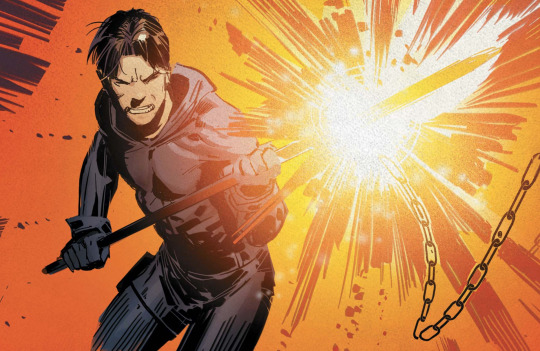
I’ve been writing posts reflecting back on my favorite parts of Charles Soule’s Daredevil run... and hey, I almost got through all of them before the new run started! The final topic I wanted to cover is Sam Chung/Blindspot, who-- alongside Real Boy Mike Murdock-- is the most significant new character Soule created during his time on the comic.
Sam has come a long way for a guy everyone thought was Gambit when his image was first released. With his introduction, he became Matt’s first official, long-term “apprentice” and a compelling addition to the ranks of Marvel’s young, up-and-coming superheroes. I’d always wanted to see how Matt would handle a sidekick, so I was very excited about this, and while I think Sam’s story was not as strong as it could have been, I am eager for him to return to further cement his role within the Daredevil universe and beyond.
Matt has acted as a mentor in the past (most notably to Angela Del Toro, the second White Tiger, during Bendis’s run), but Sam is the closest he has ever come to having an actual sidekick. Thus, his new working relationship with Sam puts him in a fun new role: passing on what he has learned as a superhero, and testing his abilities as a teacher.
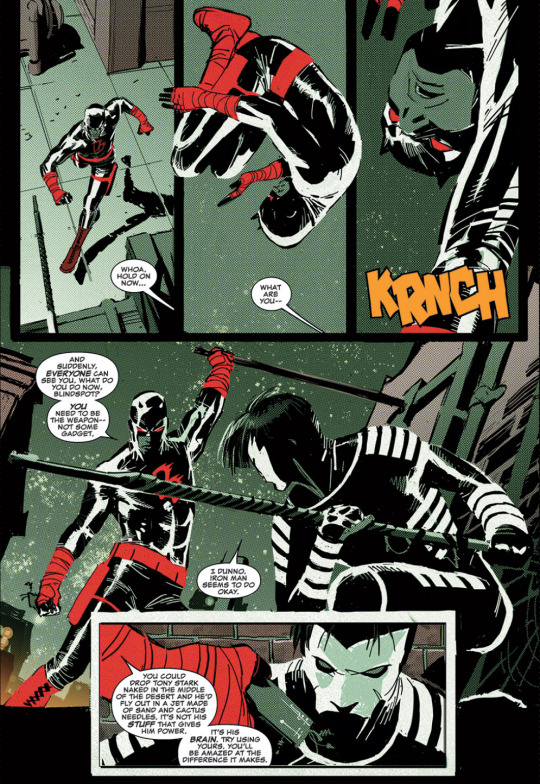
Sam: “Whoa, hold on now... what are you--”
Matt: “And suddenly, everyone can see you. What do you do now, Blindspot? You need to be the weapon-- not some gadget.”
Sam: “I dunno. Iron Man seems to do okay.”
Matt: “You could drop Tony Stark naked in the middle of the desert and he’d fly out in a jet made of sand and cactus needles. It’s not his stuff that gives him power. It’s his brain. Try using yours. You’ll be amazed at the difference it makes.”
Daredevil vol. 5 #2 by Charles Soule, Ron Garney, and Matt Milla
Soule’s run, overall, suffers from a lack of emotion. It is all plot, no character, and this weakens the development of Matt and Sam’s relationship. Beyond a touching glimpse of their initial first encounter in All-New, All-Different Point One (Sam’s introductory issue), we don’t get to see much of their developing dynamic. The run jumps right in after they have already started working together, and that’s mostly the context in which we see them-- work. We don’t get any real bonding scenes. We don’t get to see Matt decide to train Sam (which must have been a huge decision-- Matt would have been hesitant to take on that responsibility, especially since he’d just tightened up his secret identity again) or the early negotiating of their relationship. Sam later comes to see Matt as a father figure, which should be very powerful, but the only way we know that is because he comes out and says it, because of the shortage of actual parent/child-type moments between them.
That said, there is a lot to enjoy in their dynamic. Matt and Sam are very similar people, and this makes them great foils for each other. Like Matt, Sam is stubborn, smart, and often reckless. He has an attitude, as well as a huge amount of compassion and a desire to help others. He also has a lot of secrets (neither knows the other’s civilian identity for a significant amount of time, which contributes to the emotional distance mentioned above, but is also completely in-character.) And Sam and Matt work well as a team and develop a lot of respect for each other. Matt is a tough but fair teacher, and he sees himself in Sam.

Sam: “Well, I finally got the cast off my arm.”
Matt (caption): “Right. The cast for the arm Elektra broke when I introduced her to you in a fit of utter idiocy.”
Sam: “Thought I might get a workout in. It’s been a while.”
Matt (caption): “A workout. He means he’s going out on patrol as Blindspot. I get it. The hero game’s addictive. It’s hard to stay away for too long. God knows I’ve rushed back out before I was ready a hundred times. [...] He’s not listening to a word I say. Then again, when I was in his place, training with Stick... I didn’t listen much either. I heard... everything. But I didn’t like to listen. Oh, well.”
Daredevil vol. 5 #10 by Charles Soule, Ron Garney, and Matt Milla
The similarities don’t end there. Like Matt, Sam grew up in a low-income single-parent household, and has close ties to a particular Manhattan neighborhood (in his case, Chinatown). But his situation is made even more challenging by the fact that he is an undocumented immigrant, and this distinction between Matt’s experience and Sam’s is actually really interesting. Matt fully sympathizes with Sam, but there is a disconnect that highlights the additional challenges in Sam’s life that impact his budding superhero career.
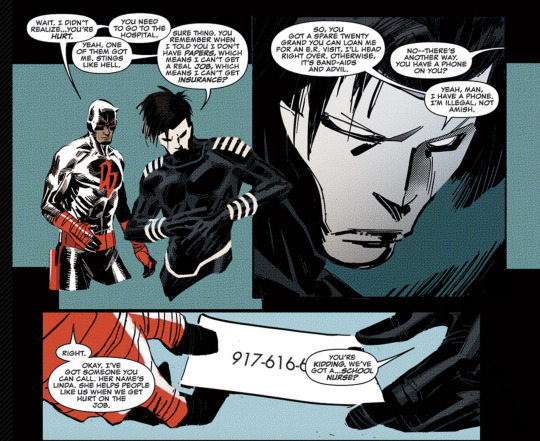
Matt: “Wait. I didn’t realize... you’re hurt.”
Sam: “Yeah. One of them got me. Stings like hell.”
Matt: “You need to go to the hospital.”
Sam: “Sure thing. You remember when I told you I don’t have papers, which means I can’t get a real job, which means I can’t get insurance? So, you got a spare twenty grand you can loan me for an E.R. visit, I’ll head right over. Otherwise, it’s band-aids and Advil.”
Daredevil vol. 5 #3 by Charles Soule, Ron Garney, and Matt Milla

Sam: “I’ve been working on this suit since I was twelve. It was supposed to be my big break. My ticket out. Until I found out how expensive it was to file a patent. How easy it is to steal inventions from illegal immigrants doing their best to stay off the radar so they don’t get deported. I invented a miracle-- a damn invisibility suit-- and now I have to spend half my pay on batteries just to keep the thing running. How the hell do the other guys do it?”
All-New, All-Different Marvel Point One, “Blindspot” by Charles Soule, Ron Garney, and Matt Milla
This is what makes Sam extra compelling and unique among the ranks of Marvel’s heroes. As an undocumented immigrant, he is in constant danger. Drawing attention to himself is really risky, because if something goes wrong and the police find out who he is, he could lose everything. The precariousness of his life makes his actions as a superhero, his willingness to put himself into the spotlight and take those risks, all the more admirable. It’s also symbolic that the invention that prompted him to become a superhero is an invisibility suit, because invisibility is a key part of his life. As a non-citizen, he feels like an outsider-- unseen, insignificant. But that invisibility is also a source of protection. The idea of someone in Sam’s position actually weaponizing invisibility, while at the same time making himself visible by became a superhero-- who, by their very nature, are public figures-- is a powerful concept. And of course, there’s symbolism in the fact that Sam is working alongside Matt-- one of the few people who can perceive him while he is invisible.
Over the course of the run, we see Sam start to build himself a reputation by becoming a benevolent presence to the people of Chinatown. By working with Matt, he gains the confidence to operate on his own-- which is helped by the fact that Sam is an independent person by both nature and necessity (much like Matt). I love the detail of the shrine in Chinatown where people leave requests for help from Blindspot (“Ghost Brother”). It’s a neat way of depicting Sam’s connection to his neighborhood and his own unique approach to hero work.
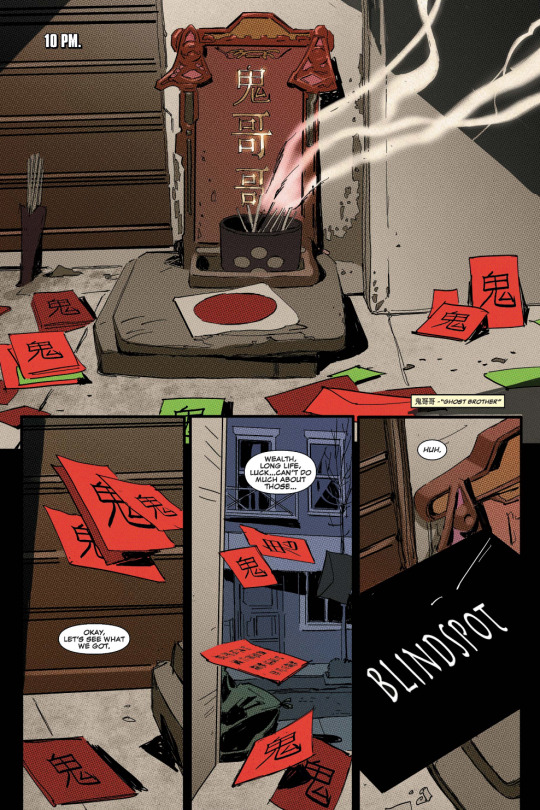
Sam: “Okay, let’s see what we got. Wealth, long life, luck... can’t do much about those...”
Daredevil vol. 5 #10 by Charles Soule, Ron Garney, and Matt Milla
Over the course of the run, we see Sam grapple with many of the key questions of superheroing. Sam, like Matt and many other heroes, started down this path to thanks to his family-- in Sam’s case, to protect his mother and sister. And like all of these heroes, he is compelled to continue out of a sense of compassion. Sam’s struggle to decide whether it is worthwhile or smart to behave selflessly, to put his life on the line for strangers, is addressed with a sense of emotional honesty that makes Sam extra relatable. It’s easy to claim to be heroic, but it’s another thing entirely to put yourself out there and actually behave heroically, and to take on the responsibility of ensuring other people’s survival.

Sam: “Why did I say that? ‘I’m not letting him kill anyone else.’ Who do I think I am? I just want to impress Daredevil. It sounded like something he would say. Do I really mean it? How far will I actually take this? This guy’s a judge. If he found out I was a vigilante, he’d probably deport me. Why should I die for him? Hell, why should I even fight for him?"
Daredevil vol. 5 #13 by Charles Soule, Ron Garney, and Matt Milla

Man: “How do you know that? Tenfingers said he would save us, and he lied.”
Sam: “Because... I... Because I am one of you. I live in this neighborhood. I know most of you. Your name is Mr. Chen, and you run the bodega on Mott Street. Because Chinatown is my home, and I’m going to keep it safe. Because I am Blindspot. And I am not lying to you. Just... just stay in here. I won’t let anything happen to you. I hope.”
Daredevil vol. 5 #5 by Charles Soule, Ron Garney, and Matt Milla
Sam’s story is enhanced by the fact that his origin is so challenging. While he is enthusiastic about working with Daredevil and the idea of being a superhero, he quickly acquires a degree of cynicism thanks to the difficulty of his situation. He became a superhero to save his mother, who doesn’t want to be saved. He is filled with doubt about his own abilities. Every time he does something heroic, he suffers for it: he is blinded after trying to rescue Muse’s victims, his mother is killed when he decides to save Matt from the Beast, and his refusal to kill Muse causes the Hand to attack New York City. He is given reason after reason to give it all up, and for a while he seriously considers it. But in the end, he doesn’t.
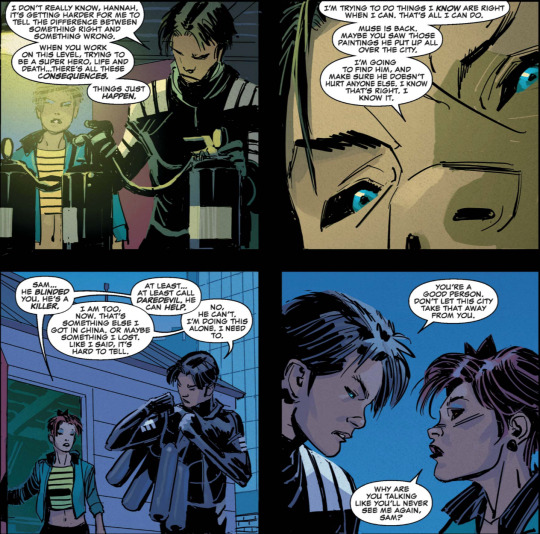
Sam: “It’s getting harder for me to tell the difference between something right and something wrong. When you work on this level, trying to be a super hero, life and death... there’s all these consequences. Things just happen. I’m trying to do things I know are right when I can. That’s all I can do. Muse is back. Maybe you saw those paintings he put up all over the city. I’m going to find him, and make sure he doesn’t hurt anyone else. I know that’s right. I know it. [...] You’re a good person. Don’t let this city take that away from you.”
Hannah: “Why are you talking like you’ll never see me again, Sam?”
Daredevil vol. 5 #599 by Charles Soule, Ron Garney, and Matt Milla
Sam’s journey is informed by the three main antagonists he encounters over the course of this run. One is Muse, who I consider to be the first member of Blindspot’s rogues gallery rather than an addition to Daredevil’s (how cool is that?!), one is the Punisher (who he encounters in DD/Punisher: Seventh Circle), and one is Tenfingers-- and by extension, the Hand. All of these challenge Sam’s superhero aspirations and force him to decide what kind of hero he wants to be. I loved Muse and Sam’s dynamic, and found the Hand a bit less compelling. (I really like the Hand, and they can be used well, but they lacked depth in this run.) But they are significant in shaping Sam’s character development, and they also tie into arguably the biggest theme of his origin story: family.
Sam wants to take Tenfingers down to save Chinatown-- but more than that, to save his mother. When he is blinded and grows disillusioned with hero work, his mother calls on the Hand to heal him and train him. Sam’s blinding is another weak area of his story. I would have found it more compelling if he had remained blind (this is Daredevil, after all!) rather than being magically healed right away. While having the Beast restore his eyes causes big problems down the road, it still feels like a side-step away from what could have been a much more interesting twist in Sam’s story. I was at least expecting the eyes themselves to cause him problems, since they’re obviously not normal eyes, but they never did. That whole story arc felt underdeveloped, which was disappointing. However! What really matters is that Sam’s time with the Hand challenges him in character-defining ways. They train him and turn him cynical about traditional superhero morality. His mother pays for the Hand’s help by promising her soul to the Beast, and to save her, Sam settles on a morally grey solution: trading her soul for Matt’s.
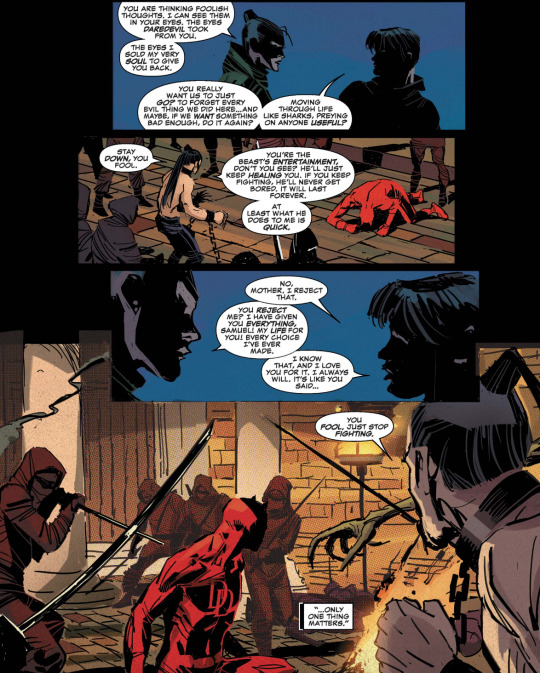
Lu Wei: “You are thinking foolish thoughts. I can see them in your eyes. The eyes Daredevil took from you. The eyes I sold my very soul to give you back.”
Sam: “You really want us to just go? To forget every evil thing we did here... and maybe, if we want something bad enough, do it again? Moving through life like sharks, preying on anyone useful? No, Mother. I reject that.”
Lu Wei: “You reject me? I have given you everything, Samuel! My life for you! Every choice I’ve ever made.”
Sam: “I know that, and I love you for it. I always will. It’s like you said... only one thing matters. Family.”
Daredevil vol. 5 #28 by Charles Soule, Ron Garney, and Matt Milla
Once again, this plot point is weakened by the lack of emotion in this run. We know that Sam’s relationship with his mother is complicated. She is a good person who has become ruthless as a way of protecting herself and her family from all of the difficulties in their life. Sam clearly loves her. But we don’t see enough of this relationship (or, for that matter, Sam’s relationship with his sister Hannah) to make this story as powerful as it should be. Sam is forced to choose between trading Matt for his mother or trying to save both, and despite his new cynicism and all of the pressures in his life-- from both his mother and the Hand-- to become a killer, Sam makes a heroic-yet-futile choice and tries to save both of them. This results in his mother’s death which, in spite of the lack of development mentioned above, is still one of the most powerful moments in the whole run.

Daredevil vol. 5 #28 by Charles Soule, Ron Garney, and Matt Milla
This serves as a turning point for Sam that carries over into the rest of the run. Despite everything he has been through and all he has lost, he decides that he still wants to be a compassionate person.
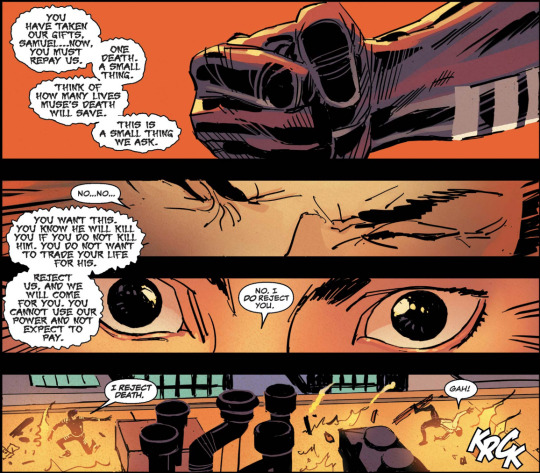
Beast: “You have taken our gifts, Samuel... now, you must repay us. One death. A small thing. Think of how many lives Muse’s death with save. This is a small thing we ask.”
Sam: “No... no...”
Beast: “You want this. You know he will kill you if you do not kill him. You do not want to trade your life for his. Reject us, and we will come for you. You cannot use our power and not expect to pay.”
Sam: “No. I do reject you. I reject death.”
Daredevil vol. 5 #600 by Charles Soule, Ron Garney, and Matt Milla
While Sam fades out of the story toward the end of the run (he didn’t get to meet Mike!) he plays a major part in battling the Hand when they attack New York. This restores his partnership with Matt, allows him to bring his animosity with both the Hand and Muse to a conclusion, and cements his image in the minds of the citizens of New York. Blindspot officially joins the ranks of Marvel’s superhero community, which-- for an undocumented immigrant who has grown up feeling displaced and unwanted-- means a lot.
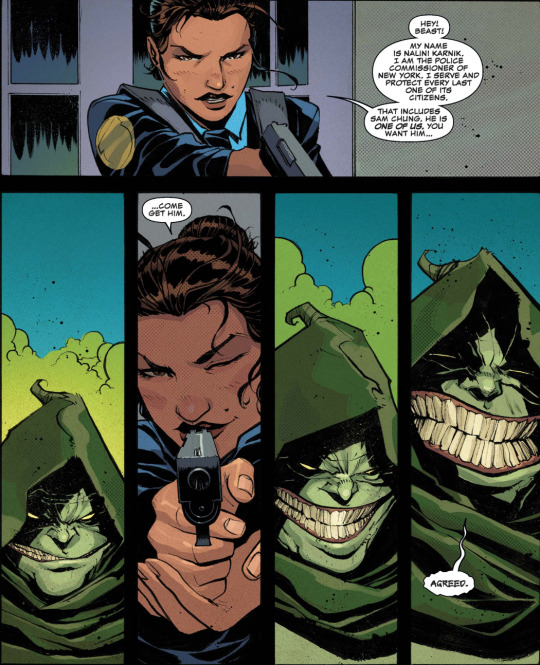
Karnik: “Hey! Beast! My name is Nalini Karnik. I am the Police Commissioner of New York. I serve and protect every last one of its citizens. That includes Sam Chung. He is one of us. You want him... come get him.”
Daredevil vol. 5 #605 by Charles Soule, Mike Henderson, and Matt Milla
This is hopefully only the beginning of Sam’s story, and I look forward to seeing him again-- both in future Daredevil runs, and ideally also within the wider Marvel universe.
106 notes
·
View notes
Text
The Con Extended Chapter Notes
Hyperlinks appear in blue (underlined on mobile). The story is posted here. Direct link to this chapter is here.
This chapter is entirely way too long. Perhaps the ‘smarter’ thing to do would have been to post the two scenes/sections separately. Both are certainly long enough for that. But I’ve always maintained that I don’t want to produce filler content. It’s like the title of Sum 41’s debut album (another thing I’ve maintained: in my heart of hearts I’m still just a dumb pop punk kid), All Killer, No Filler. The first section of the chapter, in my opinion, serves as smooth transition for the second part. But the first part just on its own? I don’t see the point. So no, it couldn’t be separate.
In the notes for previous chapters, I’ve mentioned that if I put something in the story early on, I put it there for a reason, to be called on later in the story. This chapter calls back to those little things in earlier chapters. It’s probably been a while since you actually read those little things, so I’ll point them out as I see necessary.
I nodded and began pressing the pads of my fingers against the pads of my thumbs on both hands. I glanced at the familiar cover of the book Jughead had been reading. “Hey, I read that in AP English.”
This nervous habit that Betty does throughout the first section of the chapter is first seen in Chapter 2, when Archie grills her about liking Jughead, before they hatch the plan for the con. As we go through this section of the chapter, throughout her conversation with Jughead, this nervous tick is evident (Jughead actually brings it up) but never destructive. I was thinking about the life Betty’s had in this AU. She got to move away from Riverdale as a teenager, and Alice’s influence on her life has been felt, but Betty hasn’t had to bottle up her feelings. In fact, she made great friends in Kevin and Veronica when she got to Chicago. She’s been in counseling since her apprentice year. I think not being in Riverdale is a big thing for this Betty, so I don’t think she would have had to turn to digging crescent marks into her palms in order to cope.
I wanted to draw attention to the difference between this ballet Betty and canon Betty, giving her a nervous habit that had to do with her hands but without it leading to self-harm.
“You read The Devil in the White City in your AP Lit class?” Jughead asked with disbelief.
“No.” I shook my head. “The other AP English class. The one in junior year.”
“Language and Composition?”
“Yeah,” I confirmed. “I always thought that was the better of the two AP classes for English. A lot more useful in instructing 16 year olds how to become better writers themselves and not just responding to a selection of literature through the ages written with ambitious punctuation.”
The full name of the book being referred to is The Devil in the White City: Murder, Magic, and Madness at the Fair that Changed America.
Fun fact: Leonardo DiCaprio (who gets another mention in this chapter, in the second section) bought film rights of the book in 2010. As of this year, the plan to turn it into a film is still active.
“Betty, please!” Jughead exclaimed with mock offense. “I keep my best friend charm bracelet in a very safe place and I am never giving it back. So he better not break up with me.”
Something I’d always admired about the friendship Chic and Jughead had was how matter-of-fact it was. They were two guys who loved each other platonically and were secure enough to not care if the relationship was characterized as romantic by others. They laughed endearingly about their ‘bromance’ rather than be offended by it. “Girlfriends may come and go,” Chic had once said, “but I’ll never break up with my best friend.” I thought that it took a special kind of friendship and special kind of people to be firm in that unwaveringly.
In the first chapter, Betty briefly mentioned the idea of Jughead and Chic having a bromance. I really wanted to include something in this chapter about how Jughead and Chic don’t associate that word with a negative connotation. Jughead and Archie’s friendship is portrayed so beautifully on Riverdale. As Cole Sprouse pointed out in his Teen Vogue interview, that’s not a portrayal we see very often between two guys on TV. In an alternate universe where Jughead’s best friend is Chic, I fully believe that the kind of friendship that Jughead has with his best friend is still the same.
And Betty, who has had a front row seat to this beautiful friendship, has nothing but admiration for it.
Regarding the best friend charm bracelet - it’s a bit of a reference to my favorite episode of Veronica Mars, 1x10, “An Echolls Family Christmas”. I can’t find a clip of it, but it’s something Logan says to Duncan at lunch time: “Are we breaking up now? Do you want your best friend charm back?”
“I don’t know yet…I picked it up mostly because it’s a true crime novel that’s set here, in Chicago,” he explained. “I’m leaning toward that genre for my own novel. Right now though I’m thinking that I need to give myself a better background on the Exposition.”
I hadn’t just read The Devil in the White City for my AP English class; I’d read it for my second semester paper, a long-form essay that thoroughly analyzed the devices the author used to tell the story. The story itself was an intertwining of two stories, of the architect who made an exposition of the city, and of a serial killer who used the events to lure people to their deaths at the Chicago World’s Fair (officially named The World’s Columbian Exposition) in 1893. To Jughead’s point, I felt like I was well-versed in the World’s Fair, though not necessarily because of the book.
The reason I thought to reference The Devil in the White City at all is because I remembered it as one of book the choices for the long-form paper I wrote in my own AP Language & Composition class. It wasn’t the book that I did my paper on, but now, all these years later, I definitely wish it had been! When I started writing this story, I remembered the synopsis of the book and looked it up again. A true crime novel set in Chicago, the same city that Jughead moved to for his MFA, and the same genre that I imagine Jughead would be writing? Oh, I knew immediately that it had to get a mention in this story.
When I started doing research on the Joffrey Ballet’s ‘new’ version of The Nutcracker, it all came full circle, because both the book and the events of that ballet have the same setting. I was amazed and happy with the coincidence, because it worked out perfectly for my story, for Betty and Jughead to have a conversation about the two.
Except it turns out that it’s not quite coincidence after all. While writing these notes, I found an article that states Joffrey’s choreographer and artistic director have both read The Devil in the White City, and they even used it for inspiration in re-imagining The Nutcracker.
I really don’t know how I didn’t find this article during my initial research. But oddly I think that it’s actually more satisfying that I found out after I made the connection on my own.
“The version of The Nutcracker we did at Joffrey last year, and that we’ll be doing for years to come,” I spoke, “it’s set at the fair. Marie dreams about the White City and what she would see there.”
Jughead raised an eyebrow. “Really?”
I simply nodded.
The reason that Joffrey’s new take on The Nutcracker was so uniquely Chicago was because of its take on the classic story. It was set on Christmas Eve 1892, in the winter leading up to the opening of the World’s Fair, and paid some homage to the working-class heroes of those days—all while keeping Tchaikovsky’s original score. Marie, whose vivid dreams were the basis for the dances in the production, was the daughter of a Polish immigrant mother, a widowed sculptor who worked on the statue of The Republic for the Exposition.
In Chapter 4, while talking to Sabrina, Betty mentions that in the Joffrey Ballet’s Nutcracker, the little girl’s name is Marie rather than Clara.
I read several articles about Joffrey’s reimagining of The Nutcracker in order to understand the changes (compared to a 'traditional’ version). I found the one from NPR (complete with an audio clip!) quite helpful, along with this one that breaks down what has been taken out and what has been put in.
His statement was true, too. The fall season at Joffrey always felt busier than the spring season. It seemed to drag on for too long at the beginning in September, when every day at work was spent going to company class and being in different rehearsals. But October would culminate what we worked so hard for: the performance weeks. We were about two weeks out from opening night, which meant rehearsals had moved into the theater. No matter how much mastery had come through in the dance studios, in my opinion the theater stage always gave the dances a bit of a new feel, it made them feel brand new again for those first few attempts. Especially for someone like me, who hadn’t been singled out on stage since a gala during my apprentice year, it was something to get used to. The company studios on Randolph Street had floor to ceiling windows where natural light poured in, with the piano in the corner of the room. In the Auditorium Theatre, the stage lights were blinding, casting a sea of darkness from the orchestra pit to the rafters, and the music came from downstage. The turf of the rehearsal studio floors were supposed to be the same as that on the stage, but I’d sworn ever since the academy that it felt like the stage was less rigid and had more give. I always dipped my pointe shoes in more rosin than usual for stage rehearsals, feeling like they were slipping.
If you’re a close reader, the use of both “theater” and “Theatre” must be driving you crazy in this chapter. It is intentional though. Your opinion on the right way to spell “theater” probably depends on what part of the world you live in. For me, the decision of which way to spell certain words, in American or British/International English is dependent on the story. I have used both conventions (same for words like “color” vs. “colour”) in my writing in the past. In this story, we have Betty as our narrator, an American girl living in Chicago. Therefore, I stick to American English spelling of words throughout the story. However, The Auditorium Theatre in Chicago has that spelling, that is its proper name, I can’t do anything about that. So that’s why you see both.
The Nutcracker was a different kind of beast for ballet season. It was an entire month of daily (sometimes twice daily) performances, save for Christmas Day and New Year’s Eve. That meant that there were five different casts, so dancers were assigned to different roles on different nights. Worst case scenario, I’d get to understudy for a soloist and never get to dance it in the spotlight. But it wasn’t outside the realm of possibility that if I had a good audition, and if I did well during my pas de deux with Trev in Giselle, that I could land myself in another solo role, because The Nutcracker was a big ballet with a lot of roles. So I had to be prepared. I needed to nail the Peasant pas de deux. And I needed to show something special at auditions, especially when I was up against established soloists and principals.
A quick peek at the Joffrey Ballet’s calendar for The Nutcracker reveals that Christmas and New Year’s Eve really are the only days without shows in December. The same article that told me about the connection between The Nutcracker and The Devil in the White City also told me that the huge number of shows is/was accomplished by having five casts.
I was elated. I’d soaked up every second of the Peasant pas de deux with the blinding spotlight set on my partner and me as we danced in circles around the stage. I loved it. I’d almost forgotten the thrill of having a solo role. My dance with Trev in the first act was less than ten minutes long, but it was on opening night and it felt amazing. In the backstage hair and makeup room that I’d been assigned, after the performance, I could practically feel the adrenaline pumping through my veins. I sat in front of the mirror for a long time, just settling down, before I started wiping off my stage makeup. I’d spent a fair amount of my time in the corps de ballet telling myself that I didn’t want to be a principal dancer, that I wanted to get to soloist and nothing more. Well, ten minutes in a soloist’s role and I wanted more. I would need to take some serious time to reassess exactly what I wanted from ballet once the run of Giselle was over.
In the prologue, Betty states that she wants to be a soloist but doesn’t want to be a principal dancer. I really like that once she gets the experience of a soloist’s performance, she’s not so sure anymore. I’m a big fan of Betty’s drive and determination.
The performing arts survived on sponsors, donations, fundraising, and season ticket holders. Ballet was an old art and young people weren’t exactly dying to pay for an opera house ticket (even a subsidized one, if they were students) to see an adaptation of Othello or The Sleeping Beauty. As dancers, we in the company were ever so thankful for the support that allowed us to live our dreams. In fact, with opening night also being the opening of the season, the company was hosting a party. It would be a few hours of hors d’oeuvres and champagne for the dancers, families, friends, season ticket holders—anyone and everyone that supported our craft was extended an invitation—but mostly it was for the bigwig sponsors, so they had a chance to speak to anyone in the company in a relaxed setting, to see up close and personal where their money was going.
The good thing about taking 50 million years to write this chapter and 101 million years to edit it is that it pushed me past the real life opening of the Joffrey Ballet’s Giselle. In late September, the Joffrey posted a video to their official YouTube channel showing the dancers with the principal roles of Giselle and Albrecht rehearsing in the studio (you can see the floor to ceiling windows that Betty was talking about in the first section of the chapter!), with their voiceovers, talking about dance. A few days ago a video of the company rehearsing Giselle, with interviews, was also posted. I think it’s so cool to have real visuals of what Betty has been talking about.
On the official landing page for the production, the Joffrey has also posted the program guide for Giselle. That wasn’t there when I first started doing research for the story. The season sponsors are listed (page 14), and monetary supporters and donors are listed (page 24 to 31). I was glad to be able to see the program because it acknowledges not just the bigwigs, but even small contributions as well. In my mind, that made this party more feasible.
A couple of years had passed since my brother last attended one of my performances. I was pretty sure the only thing he liked about ballet was the flexibility of all the women. He would always show up to provide his older brother support when warranted, but I’d danced strictly in the corps de ballet the last two seasons. Those of us in the corps served as understudies to the soloists, and the soloists served as understudies to the principals because as the saying went, the show must go on. There were two kinds of programs that the company performed: mixed repertoires and full-lengths. Mixed repertoires were usually the newer, innovative, contemporary works that were only one act long. During the weeks that we performed mixed repertoires, three short individual ballets were performed each night.
So I’d learned a lot of soloist roles. But since joining the corps, just my luck, all of the dancers that I’d been an understudy for had been healthy and uninjured for performance nights in the past two years—not that I wished them any undue harm. It meant that Chic hadn’t had to sit in the Auditorium Theatre since the days of my apprenticeship.
There are, indeed, two kinds of programs that dance companies do during the course of a year. Giselle is a full-length ballet. To name a few others, The Sleeping Beauty, Othello, Romeo and Juliet, and Nijinsky are all full-length ballets. The Nutcracker is also a full-length ballet.
Chroma is a mixed repertoire ballet. It is actually three ballets. The version last done by The Royal Ballet is: Chroma, Multiverse, and Carbon Life. During the 2012 fall season, the Joffrey Ballet had a mixed repertoire program called Human Landscapes: Forgotten Land, Pretty Ballet, and The Green Table.
The point is that there are different kind of ballet performance nights. Some ballets are full-lengths, with only one story from beginning to end. Others are mixed repertoires, short individual ballets performed together (with intermissions in between, of course), but not necessarily with just one story. Because of this, Betty has learned a lot of roles that she’s never actually performed.
It was too sweet, along with his actions, for someone who wasn’t my boyfriend, or at least dating me, to say. He said it with so much conviction that I actually believed him. His smile had enough confidence in it for the both of us and I felt beautiful even then, offstage, standing in front of him. After the stage makeup—pancake face, we dancers liked to call it—was removed, I’d re-moisturized and prepared for the party. I redid my makeup in more neutral tones: brown eyeliner just on the top lids, a hint of my favorite pink blush, and coral lips. My dress was structured and form-fitting, a nice shade of copper that complimented my golden locks falling in soft waves around my face.
There’s this video of NYCB principal dancer Sara Mearns talking about her stage makeup, including pancake (1:50 to 2:03).
Archie was right. Jughead wasn’t just ‘some guy’ to me. There was more at stake if I ever became one of those girls that he had to let down easy. Alternatively though, based on what he’d done in dumping Sabrina and what he’d already done for me on opening night, maybe things were looking up. I leaned toward the notion that the things he’d done were because our destiny was different. Still, I kept my crystal vision to myself.
I was listening to Fleetwood Mac’s Rumours a ton in the midst of writing this chapter. No matter what, “Dreams” is my staple. This is not the first time I’ve referenced it in a story. If that makes me cliché and unoriginal, well, so be it. More than likely you already know this, but just in case you don’t, the line in the song goes Now here I go again, I see my crystal vision. I keep my visions to myself.
Corps members liked to talk, and rumor had it that Jason’s girlfriend was pregnant. I wondered how Cheryl would deal with that, potentially losing her brother not just to another woman but a child as well. I saw Jason across the room with the supposed charlatan. She had blonde hair parted straight down the middle and was wearing a flowly dress that neither confirmed nor denied the rumors of the corps. Not that I thought about Jason Blossom a lot, but I’d always imagined that any girlfriend of his would look a little bit like his sister since they had a freaky close relationship. If anything though, the girl he was with looked like she could pass for my sister. She and Jason looked totally in love, sneaking glances at each other as they talked to Trev.
I’ve gotten a few questions about Polly’s existence in this story. I guess this was my roundabout way of including her, even if she’s not really Polly anymore.
Archie sighed. “Maybe I should take her home?”
“Okay, seriously.” I wasn’t far from stomping my foot to get my point across. “You both see me standing here, right?”
“I think that’s a good idea,” Veronica answered Archie’s question and totally ignored mine. “You deal with Kat Stratford here, I’m going to go talk to Cheryl.”
I saw an opportunity to make a 10 Things I Hate About You reference and you already know I was all over that.
Archie hauled me into an Uber soon after, before I could make an ass of myself in front of my friends and my colleagues. He’d been drinking with me, too. The last glass that I slid toward him had been the first one he’d refused. But he also outweighed me by at least a hundred pounds, so the alcohol didn’t have the same effect on him as it did on me. He was supposed to be a 21-year-old frat boy college football player, but true to his true character, he acted as the hovering, concerned puppy dog that I knew him to be. Instead of getting plastered on the dime of the Joffrey Ballet and its major sponsors, he took care of me. I was a touchy feely kind of drunk. But Archie didn’t even complain when I clung to him for the entire ten-minute ride from the Auditorium Theatre to his apartment (his place was closer than mine), listening to the radio recap of the Cubs’ sole win against the Dodgers—both battling for the NLCS title—and the Cubs trying to make it back to defend their World Series title.
The Cubs did play the Dodgers on Giselle opening night, and they did win. Unfortunately, that was the only game of the series they won, and they did not make a two-years-in-a-row repeat appearance in the World Series to defend their 2016 championship. Bummer. For the sake of their fans, I hope it’s not another 108-year drought.
The other thing I wanted to say is that after seeing Riverdale 2x03, and seeing how Archie went to find Ethel and how he comforted her, I feel very strongly that Archie in this AU would attempt to take care of drunk Betty and not just join in. Even when his methods are preposterous, the boy always tries, doesn’t he?
Babe. I liked the way it sounded rolling off his tongue, directed at me casually. I liked the way he flashed his crooked smile at me sincerely and the way he looked in his boxers and t-shirt. With the champagne dancing away down my veins, I was pretty sure he was exactly who I should be beside to end the night, my knight in shining sleep armor.
There’s a song called “Champagne” by Sugarcult. I think it should be the theme song for this chapter, specifically this line: All I can taste is champagne, dancing away down my veins.
His warning sounded right. I knew there was a reason why I wasn’t supposed to just kiss him as I pleased, but foggy thoughts clouded my mind like skyscrapers, so I couldn’t figure out why. I also knew that I’d already kissed him on several occasions before. My mind was blank on champagne. I didn’t care. I only cared that he was so cute and so close to me and that he was a good guy.
The first line in Title Fight’s “Western Haikus” goes thoughts cloud my mind like skyscrapers staring back at me. This is one of those songs I’ve been trying to figure out how to work into a story for so long. I’m so glad it worked here.
7 notes
·
View notes